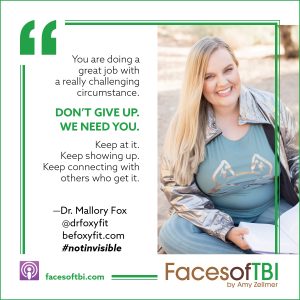 Mallory Fox, a doctor and business owner, received her TBI following a motor vehicle incident in 2018. She walked away from the scene feeling fine, but soon developed a headache that lasted over 10 months. While on vacation in San Diego, she took the time to actively rest, and discovered that her headache went away. Fox started using mindfulness to ease her symptoms, taking the time to get back in touch with herself whenever she felt her symptoms arising. Since then, she created a messaging platform to encourage mindfulness in everyday life. https://www.befoxyfit.com
Mallory Fox, a doctor and business owner, received her TBI following a motor vehicle incident in 2018. She walked away from the scene feeling fine, but soon developed a headache that lasted over 10 months. While on vacation in San Diego, she took the time to actively rest, and discovered that her headache went away. Fox started using mindfulness to ease her symptoms, taking the time to get back in touch with herself whenever she felt her symptoms arising. Since then, she created a messaging platform to encourage mindfulness in everyday life. https://www.befoxyfit.com
- Points of Interest
- (2:27) Owns Foxy Fit, a business designed to help busy people take care of themselves through mindful movement. Educational background as a doctor of health science. Experienced TBI in 2018.
- (3:09) Free texting service delivering to help incorporate mindfulness into their days to reduce stress and increase resilience.
- (4:08) A few undiagnosed concussions from youth sports; hit bottom of the pool as a competitive swimmer, then got the “go-ahead” to keep practicing.
- (5:04) August 2018: motor vehicle accident. Walked away from the scene, but 6 hours later got a headache that lasted over 10 months.
- (6:30) Had to take 4 months off from her business, returned to do work part-time, work seems very different now.
- (8:21) Despite being a movement specialist and helping people figure out how to recover, she couldn’t do the same for herself.
- (8:49) “I teach yoga, but I can’t do a Down Dog anymore because of the dizziness and tremors and everything that comes on me inverting”.
- (9:21) Symptoms continued to worsen, reached a breaking point after 4 months from forcing herself to get better. Experienced lots of denial and bargaining
- (10:08) Doctors said “here’s a usual timeframe” so when she failed to meet those expectations, it was really hard.
- (10:31) Eye had moved in the accident, so the brain shut off the other eye to try and help (movement survival). Legally blind in the left eye, restricted from driving.
- (10:56) Went to vision therapy, physical therapy, occupational therapy, psychotherapy, and treatment for EMDR.
- (11:42) “I made a promise to myself… that I would do whatever I had to do to embrace the person that I was becoming”. No longer basing identity off of accomplishments.
- (13:17) Master’s Program was in human movement, studied TBI, concussion, sports related injuries, and wrote a paper about CTE (chronic traumatic encephalopathy).
- (14:44) Was familiar with concussions, so following the accident she gave herself a concussion test and expected to just take it easy for a couple weeks.
- (16:04) If she was a professional who studied these things and she still didn’t fully understand it, how could she expect others to?
- (18:06) Tried everything: acupuncture, craniosacral therapy, massage, etc.
- (18:43) “What made the difference for me was when I started allowing myself to rest, and it’s not like, lie down in a dark room”.
- (20:42) While on trip to San Diego, husband got sick, and she got to fully rest up without having to worry about work or anything, and it was the first time she didn’t have a headache in 10 months.
- (22:31) There’s a difference between sleep and active rest.
- (25:09) Created a life where everyone depended on her, and everyone expected her to deliver at full performance right away.
- (26:38) What sucks about brain injury is that you have all these tools, but you’re the one implementing them each day. You’re the one communicating your own needs, and Fox struggled with that.
- (27:46) Getting rest taught Fox that there were indicators for when something was coming.
- (30:16) Vision issues were so bad that it hindered her very active lifestyle. Needed to transform how she thought of movement.
- (30:56) Needed something she could do anytime, anywhere. First turned to meditation, mindfulness work, and breath work.
- (31:18) Used to hate meditation, always found her mind wandering.
- (32:01) Brain makes tens of thousands of decisions a day, we can’t just shut it off.
- (32:45) Encourages doing mindfulness minutes instead of 20-60 minute intervals
- (34:02) Would start taking the time to get back in touch with the present moment. This has helped with anxiety, PTSD, and depression.
- (35:04) When she got overwhelmed, brain symptoms would come out (jaw tremor, vision problems, unsteadiness), and the act of coming out of the brain and into the present became a valuable tool.
- (35:58) Wanted to make mindfulness accessible. Healthcare is EXPENSIVE in the U.S.
- (36:33) Realized that everyone has a phone, so a text service could help people find peace. It’s very simple messages.
- (36:51) Examples of different messages (look at five things around you)
- (37:16) In the U.S. and Canada, sign up by texting “mindful” to 480-531-9810.
Listen to the full episode on iTunes Or click HERE